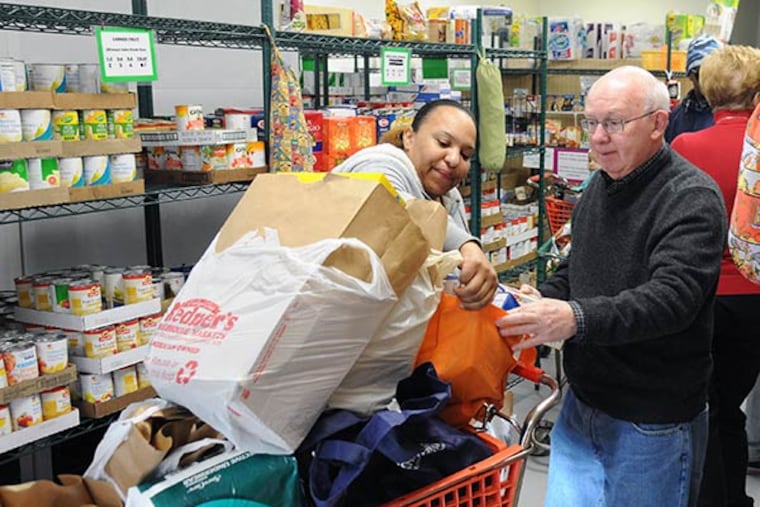Poverty, need for food seen even in tony Chesco
Carol Seaton lives beside the Brandywine River in the genteel precincts of southern Chester County. On crisp and icy days, "it looks like a Currier and Ives painting around me," said Seaton, referencing the iconic 19th-century winter tableaux of snorting horses pulling sleek sleds through snowy woods.

Carol Seaton lives beside the Brandywine River in the genteel precincts of southern Chester County.
On crisp and icy days, "it looks like a Currier and Ives painting around me," said Seaton, referencing the iconic 19th-century winter tableaux of snorting horses pulling sleek sleds through snowy woods.
But while the world around Seaton shimmers, her own life is burdened by tribulation.
A frequent patron of the West Chester Food Cupboard, Seaton, 58 and widowed with no children, lives in poverty in a tiny log cabin in Pocopson Township, where the median household income is in excess of $120,000 a year. Her home, she said, isn't far from that of the painter Andrew Wyeth, who died in 2009.
"It's difficult to live poor in a well-off area," said Seaton, who makes less than $10,000 annually caring for animals during the summer at Brandywine Picnic Park. "Sometimes, I just can't afford to eat."
Within the past week, both President Obama and Pope Francis have spoken about growing inequality throughout the world. It "challenges the very essence of who we are as a people," Obama said.
In this region, few places are as illustrative of the have-nots living uncomfortably among the haves as Chester County, antipoverty advocates say.
Ranked the 24th-richest county in America by the census, Chester County registered a 2012 median household income of $82,442.
Yet pockets of poverty are everywhere, and the number of households needing the four-year-old West Chester food cupboard's services has risen from 4,869 in 2010 to 7,173 so far this year, cupboard figures show.
The extremes of life are glaring, cupboard volunteers say.
"West Chester has become a real foodie place, a gourmet dining area," said volunteer Fiona Allison. "Yet poverty around here is wicked. It's a huge inequality that you see here every day."
One cold morning, people waited with a quiet mix of embarrassment and urgency for their chance to walk the aisles of the cupboard for their monthly visit.
Cheery and well-lighted, the independent cupboard is unlike most in the Philadelphia area. Many of them are connected to churches and run by groups of older women with a penchant for neighborhood service.
Donations fuel this cupboard, which boasts 100 volunteers, an unusually large number. Many of them are retired professionals like Allison, 69, who was a psychologist.
"Food is a human right," Allison said, "and the fact that people don't have enough is wrong."
On this day, Allison and other volunteers helped clients collect the food they needed.
Worn and weary, Terri Cross, 55, of West Chester, placed yogurt in her shopping cart and exhaled.
"It makes you tired all the time to not have money no matter how hard you work," said Cross, who grew up in West Chester and now makes $280 a week stocking shelves part-time at a grocery store. It's the only work she can find.
"I grew up knowing you have to work. But I never expected to work for a living and not make a living," she said.
Cross lives with her unemployed boyfriend, her two grown daughters, and her parents in a house owned by her retired father. He's struggling with the taxes, and Cross and her daughter each pay $1,000 a month to help with expenses, she said.
Finding good housing is hard in West Chester, where 42 percent of households have median incomes greater than $100,000, said Jeff Osgood, director of the Center for Social and Economic Policy.
Rents in the borough run to $1,000 a month for one-bedroom apartments and $1,600 for three bedrooms, Mayor Carolyn Comitta said.
That puts a strain on families who face hard times.
On any given night in West Chester, which has a population of more than 18,000, the homeless shelters are filled with more than 600 people, said Michael Hackman, administrator of Decade to Doorways, a Chester County plan to prevent and end homelessness.
As the number of cupboard clients has increased, the number of people living unsheltered - in cars, the woods, even coin-operated laundries - has grown nearly 100 percent from last year, from 24 to 43 people, Hackman said.
Poverty in the West Chester area is being fueled by job loss, divorce, and illness, said Sam Wolfgong, a cupboard volunteer. One cupboard client lives in a local McMansion but has no food to eat because she is divorced and unemployed, volunteers said.
While West Chester has become a restaurant mecca, Wolfgong said, those businesses employ dishwashers and other kitchen help who have a hard time affording a Chester County life. They, too, need help from time to time, volunteers said.
Ultimately, "it's just hard to live in a rich area when everything is so expensive," said Kerri Sweed, 36, a disabled mother of four who lost her job as a Dunkin' Donuts manager after getting injured in a car accident.
"There are so many restaurants here, and my kids keep asking if they could eat in one," Sweed said as she collected food at the cupboard. "It's hard to say no. And it's hard not to be able to provide for them, with no money for Christmas presents."
That sort of story is common in West Chester and surrounding Wyeth country, said Allison, who wishes she didn't have to show up each day.
"Ideally, we shouldn't be in existence," she said. "This is the Band-Aid, the ambulance at the bottom of the cliff.
"But if we don't do it, who will?"